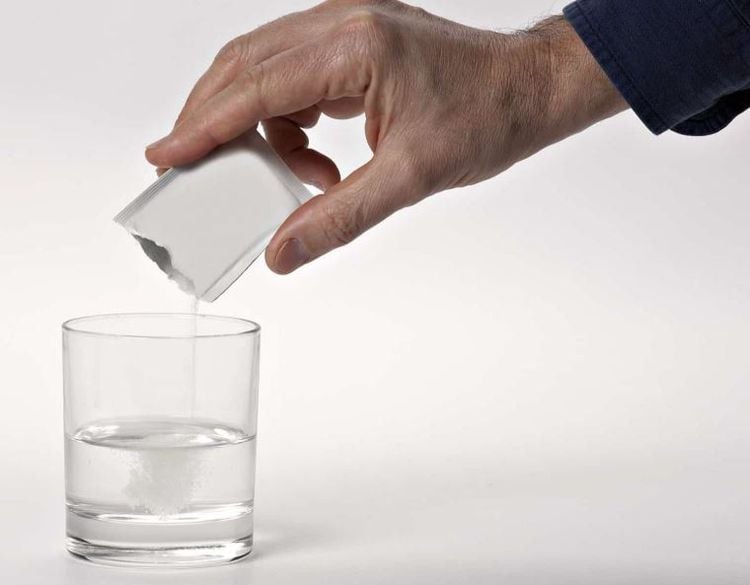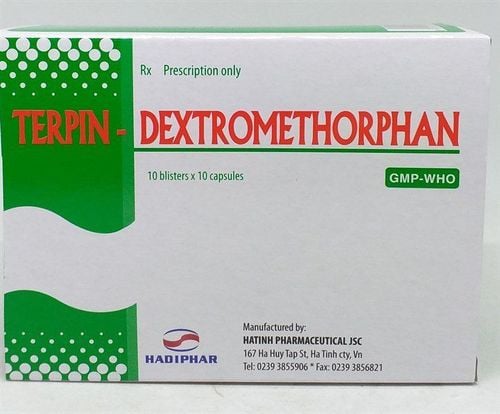This is an automatically translated article.
Ammonium chloride is an electrolyte supplement that also treats cough. The use of this drug should be strictly according to the recommended dosage because the risks encountered in overdose are relatively serious.
1. What is ammonium chloride?
Ammonium chloride or ammonium chloride for short is classified as an active ingredient in electrolyte supplements and expectorants. Dosage form and content of ammonium chloride include:
Solution for injection containing 262.5 mg/ml (Ammonium 5 mEq/mL and chloride 5 mEq/mL) concentration 0.9%; Oral solution includes active ingredient Guaifenesin 32.5 mg/5 ml, ammonium chloride 150mg/5ml and Ammonium carbonate 100mg/5ml.
2. What is the effect of Ammonium chloride?
Ammonium chloride is indicated for the following cases:
Decreased blood chlorine levels or metabolic alkalosis; Cough treatment. Besides, ammonium chloride has some contraindications as follows:
Severe liver or kidney dysfunction; Cases of metabolic alkalosis due to vomiting of hydrochloric acid with sodium loss due to increased urinary excretion of sodium bicarbonate; People with local sensitivities to any of the ingredients in ammonium chloride.

Amoni Clorid thuộc nhóm hoạt chất bổ sung điện giải và long đờm
3. Dosage and usage of Ammonium Chloride
3.1. Dosage in adults Ammonium chloride drug dosage in the treatment of hypochloremia or metabolic alkalosis:
How to use ammonium chloride: To limit side effects and local irritation, it is necessary to maintain intravenous ammonium chloride infusion. slow pulse at a rate not exceeding 5 mL/min. Some studies recommend that ammonium chloride can be administered in calculated doses over a period of 12 to 24 hours; Ammonium chloride dose (mEq) is estimated by the formula based on hypochloremia=(0.2 x body weight) x (103 - serum chlorine). Use 50% or all of this calculated dose for 12 to 24 hours, then reevaluate. In which, 0.2 is the estimated volume of distribution of chloride (L/kg), 103 is the normal concentration of serum chloride (mEq/L), body weight in kg body weight; Ammonium chloride dose (mEq) according to an estimated formula based on bicarbonate excess (metabolic alkalosis, refractory hypochloremia) = (0.5 x body weight) x (HCO3- serum concentration - 24). Use 50% of the dose calculated according to the above formula for a period of 12 to 24 hours, then reevaluate. Where, 0.5 is the estimated volume of distribution of bicarbonate (L/kg), 24 is the mean serum bicarbonate concentration (mEq/L), and body weight in kg. Dosage of ammonium chloride in the treatment of cough relief: 10ml/time, 3-4 times a day.
3.2. Ammonium chloride dosage for children For children, it is necessary to dilute ammonium chloride before starting slow intravenous infusion to avoid side effects and local irritation. The infusion time should be over 3 hours with a maximum rate of 1 mEq/kg/hour.
The following formulas use different correction methods, estimating based on hypochloremia, excess bicarbonate ion (HCO3-) or base in the body. The formulas will give different doses of ammonium chloride, in children only need to use 1⁄2 to 2⁄3 calculated dose and then reevaluate.
For intravenous line:
Ammonium chloride dose (mEq) according to the formula estimated based on hypochloremia=(0.2 x body weight) x (103 - serum chloride); Ammonium chloride dose (mEq) estimated on bicarbonate excess (metabolic alkalosis, refractory hypochloremia) = (0.5 x body weight) x (HCO3- serum - 24); Ammonium chloride dose (mEq) through the method of estimating base excess = (0.3 x body weight) x excess base. For oral administration (limited data on the issue of taking injectable drugs for oral administration:
Still calculate the dose according to the formulas above and adjust according to the individual child's response, some cases can be divided into 4 times a day; due to differences in bioavailability between oral and intravenous routes, the oral ammonium chloride dose can be adjusted to be higher than calculated, followed by close monitoring of test results. Ammonium chloride drug dosage in treating cough:
Children over 12 years old: 10ml every 3-4 times a day; Children under 12 years old are not recommended to use ammonium chloride.
3.3. Ammonium chloride drug dosage for some other subjects Ammonium chloride drug dosage in the treatment of hypochloremia or metabolic alkalosis:
Mild to moderate renal or hepatic impairment may not require dose adjustment, but caution is needed. important during use; Elderly patients: Refer to adult dosing.

Amoni Clorid cần được sử dụng đúng liều lượng chỉ định
4. Ammonium chloride side effects
During the use of ammonium chloride, some undesirable effects may occur as follows:
Consciousness disturbances such as coma, confusion, even convulsions when infusion at a fast rate; When large volumes are used, an increase in blood volume may occur; Some reactions at the infusion site such as pain, extravasation, thrombosis, infection or phlebitis; Fever; Cardiac arrhythmias; Oral administration may cause nausea, vomiting or gastrointestinal disturbances.
5. Some notes when using ammonium chloride medicine
Patients with liver failure when using ammonium chloride may lead to an increase in ammonia levels, thereby increasing the risk of hepatic encephalopathy. Therefore, its use is contraindicated in patients with severe hepatic impairment; When using ammonium chloride in patients with renal failure leads to increased urea formation, causing increased blood urea, so it is absolutely contraindicated in people with severe renal impairment; Use with caution in people with primary respiratory acidosis or impaired lung function; The following are special precautions for pregnant and lactating women when using ammonium chloride:
Animal reproduction studies with ammonium chloride have not been performed. Scientists are not aware of ammonium chloride's potential for fetal harm when administered to pregnant women or effects on fertility. Therefore, in cases where it is really necessary, only ammonium chloride should be used for this object; A risk of harm to the infant has not been excluded when ammonium chloride is administered to a nursing woman. Some problems related to ammonium chloride overdose:
When used in excess of the recommended dose, ammonium chloride can cause severe metabolic acidosis, disorientation, confusion and coma; Therefore, it is necessary to closely monitor and detect signs of ammonium chloride poisoning, including pallor, sweating, changes in breathing rate, slow or arrhythmia, dry vomiting, thirst, headache, drowsiness, myoclonus, convulsions and coma; Overdose treatment: Use an alkalizing solution such as sodium bicarbonate or sodium lactate to correct the acidosis. Simultaneously use medication to treat unusual symptoms and provide support.
6. Ammonium chloride drug interactions
Some interactions of ammonium chloride with other drugs have been recorded as follows:
Acyclovir, Amphotericin B reduce the excretion rate of ammonium chloride, thereby leading to increased drug concentration in serum; Ammonium chloride may cause a decrease in serum Amantadine and Mecamylamine concentrations; Concomitant use of Amiodarone and ammonium chloride may increase the risk or severity of hyperkalemia; Ammonium chloride reduces serum Amphetamine concentrations. This interaction stems from the fact that ammonium chloride stimulates increased urinary excretion of amphetamines; Ammonium chloride causes elevated serum concentrations of Chlorpropamide or Salicylates; Potassium-sparing diuretics may increase the side effects of ammonium chloride, namely the risk of acidosis.
Please dial HOTLINE for more information or register for an appointment HERE. Download MyVinmec app to make appointments faster and to manage your bookings easily.













